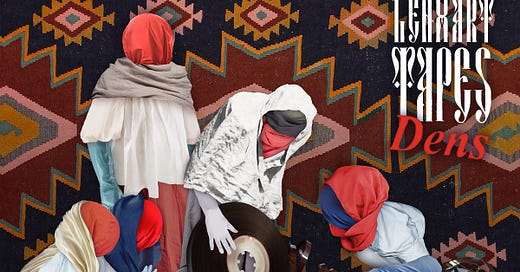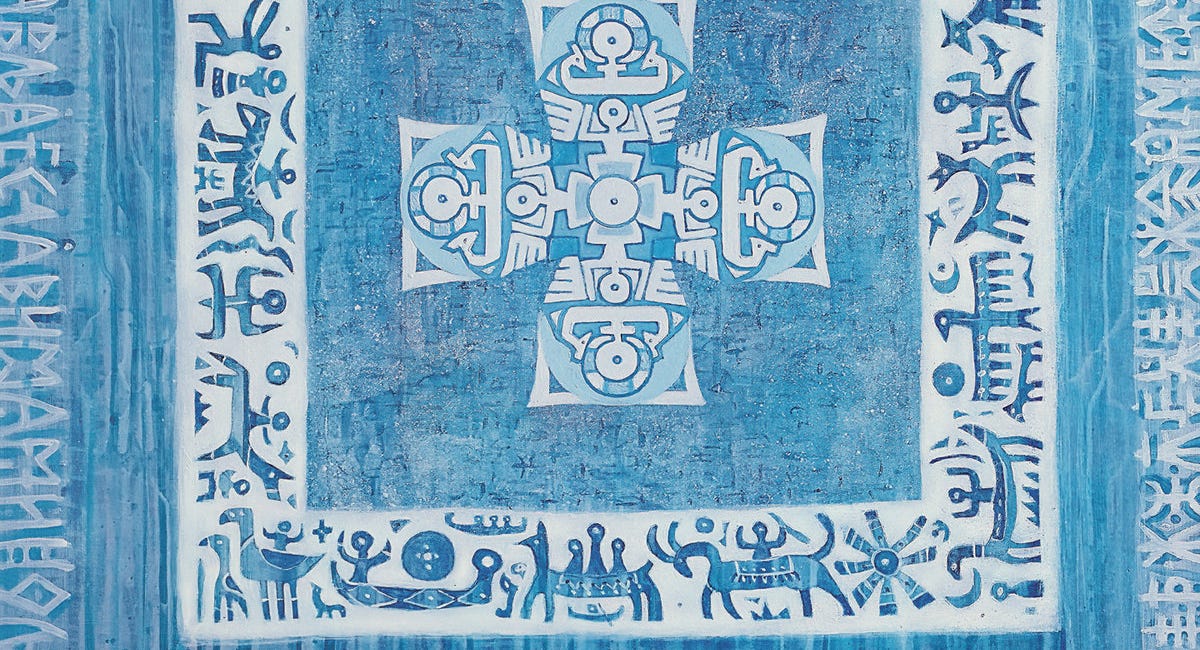Their music is difficult to explain. You will come across this phrase in announcements of performances by artists who merge different, often theoretically incompatible musical genres, use strange instruments, or play music unlike anything you've heard before. Often, these words tend to be exaggerated, but with Lenhart Tapes, that's not the case, as this group not only satisfies one of these descriptions but all three.
Lenhart Tapes definitely merges different musical genres by combining (not only) Yugoslav folk melodies with industrial, noise rhythms. They don't use strange instruments, but in creating music, they use samples, and in live performances, they use tapes, which you rarely see these days. The extent to which their music is different from anything you've heard before is best described by the fact that Glitterbeat Records, their record label, coined the term 'ethno-noise' and used the following sentences to describe Lenhart Tapes: 'Hypnotic Walkman jams meet industrial rhythm loops and trad-folk songs. A magical, beauty-and-the-beast encounter of dirty noise and righteous folk.'
Vladimir Lenhart talk about each of the songs on the album for Izvorišta:
Vodu brala (feat. Tijana Stanković)
This song, which translates as “(She was) Fetching Water”, is a folk tune of the Slovak minority living in Vojvodina in northern Serbia. I heard this song for the first time on a discarded cassette when the local radio stations went digital and the old analog equipment became obsolete. The late Maria Šagova from Stara Pazova sang the song without musical accompaniment during an interview for a radio station.
At first this recording was interesting for me to sample, later I presented it to Tijana Stanković as potential material for our duet. The whole idea for the album “Dens” (and previously “Duets”) was to replace samples with live female voices. As an ethnomusicologist, Tijana Stanković recognized the authenticity of this archaic folk song, and as an artist she breathed new life into it.
Daj mi ruka (feat. Tijana Stanković)
My fascination for the folk music of the Gorani goes back to my time in Novi Sad, when Mirjana Raić and Tijana Stanković (then students of ethnomusicology) provided me with traditional Balkan music. This song immediately drew my attention, and I can not say exactly why, but I think it's because of a certain microtonality. I remember a party at Matrijaršija where Tijana’s playlist of exclusively Gorani music was played. „Daj mi ruka“ is one of the songs from this playlist, which was popularized by the late Seldin Reka.
Džamahirija (feat. Zoja Borovčanin)
The inspiration for the song “Džamahirija” comes from an old record by the band The Green Wings – a group of students from Libya who studied in the former Yugoslavia. The band praises the theory of Gaddafi’s Jamahiriya, which was very popular among the non-aligned countries. I even found the Serbo-Croatian spoken word tape of the "Green Book" at the flea market, which is sampled in the song. With Zoja Borovčanin I made a tribute to this revolutionary idea of Jamahiriya.
Mejremo (feat. Tijana Stanković)
There was this tune in the former Yua that haunted me as a child, it was called “Sine moj”. It was sung by a Romano-Macedonian folk singer called Muharem Serbezovski and had this kind of doom metal melody that got stuck in your head forever if you were a Black Sabbath fan, for example. Later I found out it was a Turkish tune and Tijana found a Gorani version with a different lyrics that was even lower on the doom scale. Of course, it's just a song about unrequited love, which can of course be really painful. I wanted to give this tune a noise/industrial touch to sound even more apocalyptic than my childhood feeling.
Što si glava (feat. Tijana Stanković)
A fusion between two musical styles - traditional and industrial - the fusion on which the whole concept is based and which, in my opinion, overwhelmingly present on the first album „Duets“. Even though lots of instruments were recorded for this song, the basis lies in a sample from the band Godflesh, courtesy of Justin K. Broadrick.
Žuta žaba (feat. Tijana Stanković, Svetlana Spajić)
A traditional tune from Eastern Serbia, discovered through Svetlana Spajić’s concerts. The idea was to hear how this song would sound like, far away on the African continent. Here Svetlana sings it as a duet with Tijana, a well-rehearsed team from Pjevačka družina.
Kuje je dejčeno (feat. Tijana Stanković)
Another traditional Gorani melody which we've taken back to its roots with the help of drum samples, and injected it with additional groove and indispensable noise. We envisioned the „call and response“ technique between walkmans and the violin for this tune, however we haven’t reached that level of playing yet.
Starala sa (feat. Svetlana Spajić)
Recently, a friend of mine asked if I had finally recorded a homage to "We Will Fall" by the Stooges with this song. I was completely taken aback, because the original idea was nowhere near that, but the result was pretty close. Another old Slovakian song, this time in Svetlana Spajić’s interpretation. You imagine the song being sung over a "carpet of noise/drone„“, then moving into its own version of rubato, which then escalates into complete cacophony. Our producer Igor Čubrilović wanted to kill us for this arrangement.
More on Track Tales:
Track Tales: PoiL Ueda - Yoshitsune (Dur et Doux 2023.)
This is a crazy year for the French-Japanese project PoiL Ueda. In March they released their first joint album together ("PoiL Ueda"," Dur et Doux), and after that they toured all over Europe, including Zagreb. Now they're back with a new album, "Yoshitsune"." The wonderful combination of the Japanese artist
Azmari - Maelström (Sdban Records 2023.)
The Belgian music scene has produced a large number of brilliant bands in recent years, drawing inspiration from influences of traditional music from around the world and combining them with funk, jazz, groove and various other musical styles. Azmari
The Cyclist Conspiracy - Mashallah Plan (Subsound Records 2023.)
The Cyclist Conspiracy is one of those bands whose music is very hard to categorize. The easiest way to describe it would be to say that they play psychedelic rock with folk influences, but such a description would only scratch the surface of the amount of energy this Serbian band has. Their songs often dance on the edge of chaos, never crossing it, mai…







